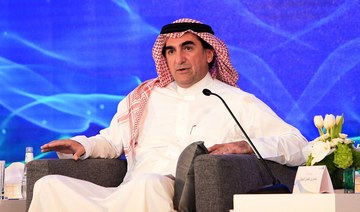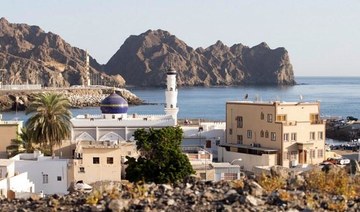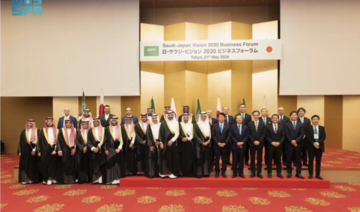NEW YORK: Morgan Stanley lost nearly $1 billion from the collapse of family office Archegos Capital Management, the bank said on Friday, muddying its 150 percent jump in first-quarter profit that was powered by a boom in trading and deal-making.
Morgan Stanley was one of several banks that had exposure to Archegos, which defaulted on margin calls late last month and triggered a fire sale of stocks across Wall Street.
Morgan Stanley lost $644 million by selling stocks it held related to Archegos’ positions, and another $267 million trying to “derisk” them, Morgan Stanley CEO James Gorman said on a call with analysts.
“I regard that decision as necessary and money well spent,” he said.
The bank did not disclose losses right away because they were not deemed material in the context of its overall results, he added.
Morgan Stanley is not alone in nursing losses as a prime broker for Archegos. Switzerland’s Credit Suisse Group AG and Japan’s Nomura Holdings Inc. bore the brunt, having lost $4.7 billion and $2 billion, respectively.
Goldman Sachs Group Inc., Deutsche Bank and Wells Fargo & Co. also handled Archegos positions but exited them without losses.
Morgan Stanley did not realize that Archegos had similar, concentrated positions at several banks across Wall Street, Chief Financial Officer Jonathan Pruzan said. As such, the collateral requirements it imposed were only reflecting Archegos’s particular risks at Morgan Stanley, not the risks across the fund’s broader portfolio.
Morgan Stanley has reviewed its prime brokerage business for similar problems but not found any, Pruzan said. The bank is looking more broadly at its method for stress testing, and will recalibrate positions with clients as necessary.
“We are never happy when we take a loss,” he said. “But the event is over ... and we will learn from the experience.”
The Archegos saga is likely to have regulatory repercussions, however, with a slew of US watchdogs as well as the Senate Banking Committee all probing the incident to better understand why some banks were so exposed to a single client.
Gorman appeared exasperated at times during the call as he faced repeated questions from analysts about Archegos, distracting from the bank’s otherwise stellar performance. Morgan Stanley’s shares were down 1 percent.
“It’s not a financial event in the grand scheme of things, but it will likely raise concerns,” Oppenheimer analyst Chris Kotowski wrote in a note to clients.
Although Morgan Stanley’s Archegos loss dominated the discussion on Friday, its first quarter profit comfortably beat expectations. Its report wrapped up a robust quarter for the biggest US banks, which benefited from reserve releases and record capital markets activity.
A spike in trading, partly driven by a Reddit-fueled trading frenzy in “meme” stocks like GameStop Corp, drove a 66 percent jump in revenue at Morgan Stanley’s institutional securities business.
Unlike rivals JPMorgan Chase & Co. and Bank of America, Morgan Stanley and Goldman Sachs lack big consumer lending units, which has limited their exposure to loan problems during the pandemic and allowed them to focus on investment banking and trading.
Morgan Stanley’s profit rose to $3.98 billion, or $2.19 per share, in the quarter ended March 31, from $1.59 billion, or $1.01 per share, a year ago.
Analysts were looking for a profit of $1.70 per share, according to IBES data from Refinitiv.
Net revenue jumped 61 percent to $15.72 billion.
Morgan Stanley reveals $911m Archegos loss as profit jumps
https://arab.news/49edr
Morgan Stanley reveals $911m Archegos loss as profit jumps

- Morgan Stanley’s profit rose to $3.98 billion, or $2.19 per share, in the quarter ended March 31, from $1.59 billion, or $1.01 per share, a year ago
Global businesses urged to acknowledge role in human development

RIYADH: Businesses worldwide must acknowledge their role in shaping human development, paralleling the responsibility of governments, said a top Saudi official.
During a panel discussion titled “Board of Changemakers: Invest in Dignity” at the Future Investment Initiative Priority Summit in Rio de Janeiro, Saudi Arabia’s Ambassador to the US Princess Reema bint Bandar emphasized the absence of a sense of collective impact on a global scale.
This observation coincides with ongoing geopolitical tensions such as the conflict in Gaza and the Russia-Ukraine tensions.
“If the business world fails to recognize its responsibility in shaping human development, akin to the responsibility of governments, we are all lost,” Princess Reema stated.
She stressed the importance of broadening the understanding of the beneficiaries of business activities, underscoring that social impact is as crucial as financial return.
“And I think we forget that we need to broaden our understanding of who is impacted by the work that we do, who is impacted by our gain, who is impacted by our profit,” she added.
Princess Reema highlighted that social stability and growth are prerequisites for sustainable business success.
“If we’re talking about investing in dignity, we have to invest in stability, we have to invest in growth, we have to invest an opportunity,” the Saudi envoy noted.
In another panel titled “Will Ascending Economic Powers Reshape the Future of Investment?” Saudi Tourism Minister Ahmed Al-Khateeb discussed the Kingdom’s shift from an oil-centric focus to diversifying into sectors like tourism and mining, as outlined in Vision 2030.
Al-Khateeb outlined three essential pillars for this transformation: a clear vision for the future, leadership and commitment, and a long-term perspective.
“First, it requires a very clear vision for the future, and we have an amazing leader, the crown prince, who established this vision and second it requires a leadership and willingness and we are all, you know, fully committed to make this happen,” the minister said.
“And the third pillar is a long-term view, we must have a long-term view about the future. We must not just look at the short term rather than look at the long term.”
The summit, themed “Invest in Dignity,” aims to explore how investments in renewable energy, artificial intelligence, entrepreneurship, and social impact can prioritize human dignity in policymaking. Discussions also focus on safeguarding the dignity of all citizens as a fundamental goal for economic decision-makers.
Saudi EXIM forges key international partnerships during Greek visit

RIYADH: Saudi EXIM Bank and its Swedish counterpart have signed an agreement to enhance the Kingdom’s non-oil exports and explore trade and investment opportunities.
In an X post following the deal, the Saudi lender stated that the memorandum of understanding with the Swedish Export Credit Agency was inked in the Greek capital, Athens.
The agreement, signed by Saad Al-Khalb, CEO of Saudi EXIM, and Anna-Karin Jatko, director general of EKN, aims to enhance cooperation between the two sides, improving access and expanding the Kingdom’s non-oil exports into the Swedish markets.
Al-Khalb was in Athens to participate in the TXF Global 2024 event held from June 11 to 12. The event brought together executive leaders, policymakers, and experts in the field of export credit from various countries worldwide.
During a panel discussion, the CEO emphasized that Saudi EXIM has extended $12 billion in credit facilities encompassing both lending and insurance. He outlined the organization’s ambition to achieve an annual facility exceeding $20 billion by 2030.
Al-Khalb underscored that the bank has issued the largest insurance policy in the Middle East, valued at $2 billion, covering 450 financial institutions.
Additionally, he highlighted the bank’s contributions to Saudi Arabia’s sustainability and renewable energy initiatives, both domestically and internationally.
During the tour, Al-Khalb also met with Raja Al-Mazrouei, CEO of Etihad Credit Insurance of the UAE. The discussions revolved around identifying areas of collaboration to boost bilateral and regional trade, promote mutual commercial projects, and improve the efficiency of transactions with global markets, according to official statements.
Additionally, he met with John Hopkins, the CEO of Export Finance Australia. Their discussions centered on exploring opportunities for collaboration to enhance economic ties and trade between their respective countries. They also explored ways to facilitate the entry of Saudi non-oil exports into the Australian markets.
Additionally, the Saudi CEO engaged in discussions with Andre Gazal, the Global Head of Financing at Credit Agricole Bank of France. They reviewed the progress of projects stemming from the memorandum of understanding signed between their organizations in 2023.
Furthermore, they explored potential avenues for collaboration to facilitate Saudi exports in the targeted markets across the African continent.
Additionally, Al-Khalb convened with Richard Hodder, the managing director and global head of export agency finance at Citibank. Their discussions focused on identifying optimal methods to strengthen mutual cooperation and offer the requisite credit solutions to bolster the expansion of Saudi non-oil exports in targeted markets.
They also delved into collaboration opportunities in financing priority projects and industries.
With a vision to empower the Saudi non-oil economy in global markets, the bank is also on a mission to facilitate the Kingdom’s exports’ access to global markets by bridging financing gaps and mitigating export risks.
Additionally, Al-Khalb met with Tone Lunde Bakker, CEO of Export Finance Norway, to discuss opportunities for collaborative efforts aimed at bolstering trade relations, fostering investment opportunities between their respective countries, and facilitating the entry of Saudi non-oil exports into the Norwegian markets.
Closing Bell: Saudi main index continues it downward movement

RIYADH: Saudi Arabia’s Tadawul All Share Index continued its downward trend for the third consecutive day as it shed 123.66 points to close at 11,651.81 on Wednesday.
The total trading turnover of the benchmark index was SR10.38 billion ($2.77 billion) with 38 stocks advancing and 195 declining.
Saudi Arabia’s parallel market Nomu also shed 198.71 points to close at 26,649.44.
The MSCI Tadawul Index slipped by 1.12 percent on to 1,456.40.
The best-performing stock of the day was Saudi Manpower Solutions Co. The firm’s share price soared by 20.67 percent to SR9.05.
Other top performers included Miahona Co. and Retal Urban Development Co., whose share prices surged by 9.96 percent and 7.11 percent respectively.
The worst performer of the day was Al-Baha Investment and Development Co. as its share price edged down by 7.14 percent to SR0.13.
Rawasi Albina Investment Co. emerged as the best performer on Nomu with its share price increasing by 9.25 percent to SR5.79.
The share price of Pan Gulf Marketing Co. and Tam Development Co. also surged by 7.78 percent and 7 respectively.
On the announcements front, Jahez International Company for Information System Technology disclosed that it purchased a real estate property at a value of SR150 million in Riyadh’s Al-Mohammadiyah district in Riyadh.
In a Tadawul statement, the company noted that the transaction will be financed from banking facilities at a value of SR105 million, while the remaining payment will be paid through the company’s own resources.
Meanwhile, TAM Development Co. announced that shareholders approved the board of directors’ recommendation to distribute a 12.3 percent cash dividend, or SR1.23 per share for the last financial year.
Saudi Arabia keen to invest in multiple sectors in Brazil: PIF governor

RIYADH: Saudi Arabia’s sovereign wealth fund is keen to invest in Brazil across multiple sectors such as technology, renewables, and mining, said a top official.
Speaking at the inaugural ceremony of the Future Investment Initiative Priority Summit in Rio de Janeiro on Wednesday, Yasir Al-Rumayyan, governor of the Public Investment Fund, said that the Kingdom will also seek investment opportunities in football.
“We started investing in Brazil in 2016 through one of our subsidiaries, SALIC, in food securities. We are interested in investing in technology, renewable energy, and mining, and hopefully in football too,” said Al-Rumayyan.
He added: “About 70 percent population of Saudi Arabia is under the age of 35. So, some of the things that we are interested in are recreation, entertainment, and sports. And this is like the best place to discuss football.”
PIF’s plans to increase its assets
Al-Rumayyan also remarked that the wealth fund is planning to increase its assets by $2 trillion to $3 trillion by 2030.
“PIF is an institute that was established in 1971. But in 2015, we started with a new strategy led by our chairman, the crown prince (of Saudi Arabia). About 80 percent of our investments are domestic investments which is about $800 billion. Our assets under management are (worth) about $1 trillion, and we are targeting to get to $2 to $3 trillion by 2030,” he said.
During the talk, the PIF governor, who is also chairman of Saudi Aramco, said that the Kingdom is at the forefront of the world’s sustainable energy transition journey.
He also added that the strategy of Saudi Arabia is to have 50 percent of the Kingdom’s energy needs met from renewable sources by 2030.
“Saudi Arabia is one of the most advanced nations when it comes to sustainability and renewable energy. In NEOM, we have one of the largest green hydrogen projects, worth $8.4 billion. Saudi Arabia is making renewable energy one of the very cost-effective kinds of energy, and that is the way we can get more and more investments,” said Al-Rumayyan.
He also noted that Saudi Arabia and Aramco are extending their commitment to nature by planting trees to ensure a green future.
Al-Rumayyan also stressed the need to deploy more investments in the Global South to meet the renewable energy targets.
Talking about the rise of artificial intelligence in the energy sector, Al-Rumayyan noted that the rise of advanced technology will consume more electricity and there is an urgent need to ramp up renewable production capacity to fuel these projects, alongside reducing emissions.
“This is the beginning of the AI era. No one can really predict the use and requirements. Energy consumption with AI will really go off the roof. We are expecting an increase in power consumption by 3 to 6 percent on an annual basis due to the use of AI,” said Al-Rumayyan.
He added: “We should look for solutions (as to) how to power AI revolution through renewable energy. And that is what we are working on. And, Brazil is well-positioned to be one of the major players. What you need is the right regulations and government backing, along with an investment mix.”
Al-Rumayyan also noted that the upcoming FII Summit in Riyadh in October 2024 will be one of the biggest of its kind in the world.
“The upcoming FII summit in Riyadh in October will be the largest investment conference in the world. We will have 300 to 500 speakers, along with 5,000 to 7,000 participants,” said the PIF governor.
Brazil eyes partnership with Saudi Arabia
During his speech, Brazilian President Luiz Inacio Lula da Silva said that the country’s relationship with Saudi Arabia has always been strong, and will continue in the future.
“My visit to Riyadh, last November, and the recent visit of my vice president show that we are giving tremendous impetus to the collaboration between Saudi Arabia and Brazil. I see great potential in the relationship with Saudi Arabia. I wanted to be a role model of South-South relations which we all want to promote,” said the president.
He also outlined that Brazil is turning out to be a favorite destination for investors due to its friendly regulatory reforms and stable economic conditions.
“The most important thing for an investor is stability, and this Brazil has plenty to offer. We also guarantee social stability, economic stability, and fiscal stability,” he noted.
“We are not just the Brazil of soccer or Brazil of the violence. We are also the Brazil of the men and women who want to grow and develop,” added the president.
For his part, Eduardo Paes, mayor of Rio de Janeiro, said that events like FII will promote and strengthen ties between Brazil and Saudi Arabia.
“We seek new partnerships and opportunities with Saudi Arabia to grow. Rio de Janeiro is the ideal point of entry for Latin America,” said the mayor.
Invest in Dignity
This edition of the FII Priority Summit is being held in Rio de Janeiro under the theme “Invest in Dignity.”
Talking about the theme of the event, Richard Attias, CEO of FII Institute, said: “Dignity is not just a concept, it is a fundamental human right that should be accessible to every human being. Dignity is a foundation upon which we built an inclusive society where every person can live with respect, purpose, and opportunity.”
He concluded: “Investing in dignity means creating a system that empowers people to foster equality and promote sustainable development. It means protecting human rights and fostering an environment where every word is heard and valued.”
Saudi government’s proceeds from Aramco’s secondary offering could hit $12.3bn

RIYADH: The Saudi government’s proceeds from oil giant Aramco’s secondary offering of its shares hit SR42.10 billion ($11.2 billion) and are expected to rise further.
In a statement, Aramco said that if the additional allocation is exercised, the government’s proceeds will surge to reach SR46.1 billion.
This falls in line with the company’s strategic vision to become the world’s leading integrated energy and chemicals company.
It also aligns well with its aim to strengthen its global position by maintaining its oil processing, expanding its gas production capacity, and integrating its upstream and downstream operations to secure demand for its crude oil.
Earlier in June, Aramco began the sale of more than $10 billion worth of shares, marking the company’s second listing after its initial public offering in December 2019 which raised $25.6 billion – the largest flotation in history.
“The offering will be made to institutional investors in Saudi Arabia, institutional investors located outside Saudi Arabia who are qualified in accordance with the Rules for Foreign Investment in Securities to invest in listed securities and eligible retail investors in the Kingdom and other GCC (Gulf Cooperation Council) countries,” stated Aramco in a press release at the time.
It also added at the time: “Outside the Kingdom, the offering will be made in compliance with Regulation S under the US Securities Act of 1933.”













